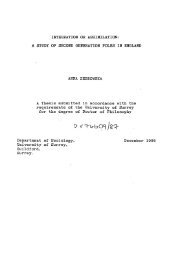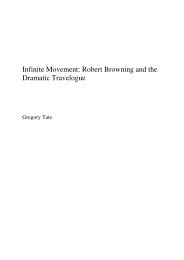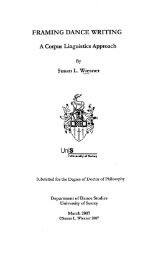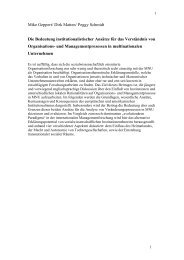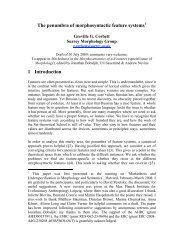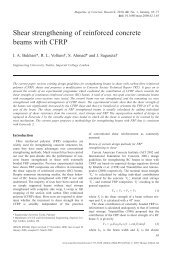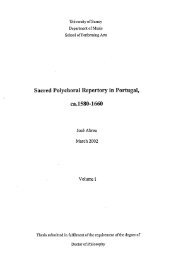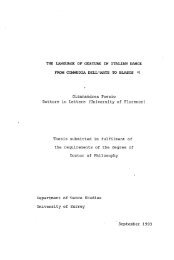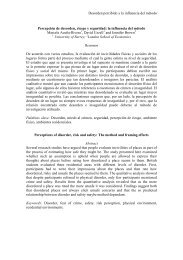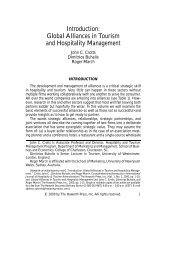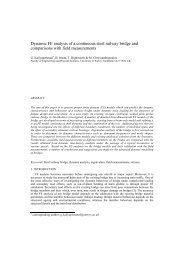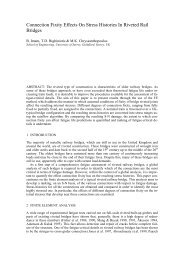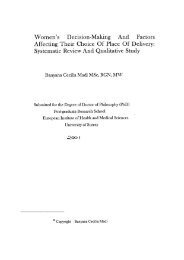- Page 1 and 2:
A STUDY OF THE FACTORS OF CONSUMER
- Page 3 and 4:
page ii Enjoyment and Adventure, Ac
- Page 5 and 6:
AbtráctContéñtsandAkncè Eë:CGi
- Page 7 and 8:
page vi LIST OF GRAPHS LIST OF PLOT
- Page 9 and 10:
A STUDY OF THE FACTORS OF CONSUMER
- Page 11 and 12:
Tht'Iakand8ëifitsof page 2 3. The
- Page 13 and 14:
page 4 CONCEPTUAL ISSUES IN THE MEA
- Page 15 and 16:
page 6 Scope, nature and meaning of
- Page 17 and 18:
- page 8 The dimension and nature o
- Page 19 and 20:
page 10 A INVESTIGATION OF THE DEFI
- Page 21 and 22:
page 12 The need for an internation
- Page 23 and 24:
- page 14 The work of Hunziker and
- Page 25 and 26:
page 16 Definitions emphasizing the
- Page 27 and 28:
page 18 2. A definition should not
- Page 29 and 30:
page 20 Domestic travel only became
- Page 31 and 32:
C13ptertneptua page 22 Measurement
- Page 33 and 34:
page 24 consumers. For example, a g
- Page 35 and 36:
page 26 considered an industry'. Th
- Page 37 and 38: thptePcbept page 28 Smith (1988) im
- Page 39 and 40: Chapter 1Co1eptua page 30 Public pe
- Page 41 and 42: page 32 The characteristics most co
- Page 43 and 44: page 34 improvement in product bene
- Page 45 and 46: page 36 In developing a greater und
- Page 47 and 48: - page 38 Main Forms of Activity Re
- Page 49 and 50: page 40 b) Tourism is also a fragme
- Page 51 and 52: - page 42 Definitions in tourism ca
- Page 53 and 54: page 44 Goodfellow, J.H., 1983, 'Th
- Page 55 and 56: - page 46 Wahab, S., 1975, Tourism
- Page 57 and 58: page 48 OVERSEAS HOLIDAYS - THE MAR
- Page 59 and 60: According to Middleton (1988): "pro
- Page 61 and 62: page 52 of the market (Thomson 38.7
- Page 63 and 64: page 54 Each of these factors reinf
- Page 65 and 66: page 56 The History of Inclusive To
- Page 67 and 68: page 58 whereas in 1987, they made
- Page 69 and 70: page 60 Increased leisure time may
- Page 71 and 72: - page 62 (1987) believes that the
- Page 73 and 74: page 64 TABLE 2.1 PURPOSE AND DESTI
- Page 75 and 76: page 66 TABLE 2.3 UK TRAVELLERS ABR
- Page 77 and 78: The Overseas page 68 TRAVEL AGENTS.
- Page 79 and 80: page 70 commercial travel agents in
- Page 81 and 82: page 72 sell. The client may even v
- Page 83 and 84: page 74 of electronics in the touri
- Page 85 and 86: page 76 system which has around 150
- Page 87: page 78 Recent developments amongst
- Page 91 and 92: page 82 advantage can be achieved b
- Page 93 and 94: page 84 East, M., 1990, UK Sectoria
- Page 95 and 96: CHAPTER THREE AN EXAMINATION OF THE
- Page 97 and 98: DISCUSSION OF SOME KEY ASPECTS OF C
- Page 99 and 100: chapter :3 The page 90 rational and
- Page 101 and 102: some of the components examined by
- Page 103 and 104: Chipter 3: The C irBthaviàü Proce
- Page 105 and 106: page 96 strength of their need for
- Page 107 and 108: 'going away from' rather than 'goin
- Page 109 and 110: Mill and Morrison's approach (1985)
- Page 111 and 112: The page 102 individuals have an av
- Page 113 and 114: page 104 abasement. These and other
- Page 115 and 116: page 106 Dominance: To influence or
- Page 117 and 118: page 108 beliefs and expectations a
- Page 119 and 120: page 110 On analyzing the transcrip
- Page 121 and 122: page 112 Freudian theory: A basis f
- Page 123 and 124: cha*e*32Thecoiijai' page 114 such p
- Page 125 and 126: page 116 AN EXPLANATION OF THE APPR
- Page 127 and 128: page 118 UNDERPINNINGS OF THE TERM
- Page 129 and 130: page 120 whereas it may be essentia
- Page 131 and 132: chapter 3TheCäiiàii page 122 dest
- Page 133 and 134: page 124 Role and Family Influence
- Page 135 and 136: page 126 The study of Davis et al (
- Page 137 and 138: page 128 In addition to particular
- Page 139 and 140:
page 130 underpinnings came mainly
- Page 141 and 142:
page 132 FIGURE 3.3 THE NICOSIA MOD
- Page 143 and 144:
chipter3.;The :coiai page 134 purel
- Page 145 and 146:
page 136 The EKB model, Figure 3.4
- Page 147 and 148:
page 138 The model is characterised
- Page 149 and 150:
The page 140 PIGUR 3.5 THE HOWARD--
- Page 151 and 152:
page 142 FIGURE 3.6 HOWARD--OSTLUND
- Page 153 and 154:
page t4 were studied within this th
- Page 155 and 156:
chapte!:3::niecaiuw page 146 The Pr
- Page 157 and 158:
page 148 Field 2: Personal and soci
- Page 159 and 160:
page 150 The model (with the except
- Page 161 and 162:
page 152 'holiday' itself, of the m
- Page 163 and 164:
page 154 The third stage is the hol
- Page 165 and 166:
page 156 Mathieson and Wall (1982)
- Page 167 and 168:
page 158 by the level of confidence
- Page 169 and 170:
page 160 CONCLUS ION This chapter h
- Page 171 and 172:
page 162 Crompton, J., 1979, Why Pe
- Page 173 and 174:
page 164 Jenkins, R., 1978, Family
- Page 175 and 176:
The consu page 166 Pearce, P.L. 198
- Page 177 and 178:
CHAPTER FOUR THE METHODOLOGICAL APP
- Page 179 and 180:
page 170 The overall objectives of
- Page 181 and 182:
page 172 Descriptive research. The
- Page 183 and 184:
page 174 quantitative research wher
- Page 185 and 186:
page 176 logical positivism faced t
- Page 187 and 188:
page 178 Induction and Deduction Co
- Page 189 and 190:
chJ*4The$etIiocktc page 180 Ficzure
- Page 191 and 192:
ctpt4TheMetho&tc1 page 182 qualitat
- Page 193 and 194:
page 184 The Need for a Combined Ap
- Page 195 and 196:
page 186 THE FINAL METHODOLOGICAL A
- Page 197 and 198:
page 188 FIGURE 4.6 COMPARISON OF P
- Page 199 and 200:
th4W4TheNethobt page 190 for a part
- Page 201 and 202:
chater4The*eth&bL page 192 its poss
- Page 203 and 204:
page 194 states, their reliability
- Page 205 and 206:
chp4:;TheMet1t page 196 Constructio
- Page 207 and 208:
page 198 6) to determine the extent
- Page 209 and 210:
cb$*ei4The$ethxbta'f page 200 In ex
- Page 211 and 212:
chi4::The$ettt page 202 In summary
- Page 213 and 214:
page 204 viii Q26 on the draft ques
- Page 215 and 216:
page 206 eighteen) was planned to b
- Page 217 and 218:
page 208 above and if there was no
- Page 219 and 220:
page 210 Despite the advantages of
- Page 221 and 222:
A DETAILED EXPOSITION OF MULTIDIMEN
- Page 223 and 224:
page 214 Several approaches to MDS
- Page 225 and 226:
page 216 o shape or mode of the dat
- Page 227 and 228:
page 218 Advantages and Disadvantag
- Page 229 and 230:
page 220 Goodrich (1978) using the
- Page 231 and 232:
chptt4The$ethock page 222 countries
- Page 233 and 234:
page 224 REFERENCES FOR CHAPTER FOU
- Page 235 and 236:
page 226 Kelly, G. A., 1955, Psycho
- Page 237 and 238:
page 228 Sykes, W., 1989, Validity
- Page 239 and 240:
page 230 THE RESEARCH RESULTS Intro
- Page 241 and 242:
page 232 The match of socio-economi
- Page 243 and 244:
chapters:: The page 234 Change and
- Page 245 and 246:
chaptei5zThe1teea-chR page 236 The
- Page 247 and 248:
page 238 TABLE 5.7 COMPARATIVE BENE
- Page 249 and 250:
page 240 QUESTION FOUR RESULTS PROV
- Page 251 and 252:
page 242 A Review of the Weighting
- Page 253 and 254:
page 244 GRAPH 5.3 MOTIVATION COMMI
- Page 255 and 256:
cbaptet5zTheRér' page 246 The new
- Page 257 and 258:
page 248 TABLE 5.12 MALE TO FEMALE
- Page 259 and 260:
ciiapter5meRarchRez page 250 The fi
- Page 261 and 262:
page 252 TABLE 5.14 MOTIVATION BY S
- Page 263 and 264:
tt:ih:Rëierch page 254 PART TWO RE
- Page 265 and 266:
page 256 The formula used by the Al
- Page 267 and 268:
page 258 MDS was also carried out f
- Page 269 and 270:
page 260 plot for these results can
- Page 271 and 272:
page 262 PLOT 5.1. MDS Q7 NONLINEAR
- Page 273 and 274:
page 264 PLOT 5 • 3 MDS PLOT OF Q
- Page 275 and 276:
iaper5TheResearthRuLts .. DtGiLbèi
- Page 277 and 278:
page 268 PLOT 5.7 MDS PLOT OF Q9 TR
- Page 279 and 280:
page 270 PART THREE RESULTS Evoked
- Page 281 and 282:
page 272 GRAPif 5.5 EVOKED AREA SET
- Page 283 and 284:
page 274 groups to select far away
- Page 285 and 286:
page 276 A graphical display (Graph
- Page 287 and 288:
.c1:1et page 278 GRAPH 5.7 LIKELIHO
- Page 289 and 290:
page 280 DECISION RULES RELATED TO
- Page 291 and 292:
chaptei5.: The Reseat-ch Results pa
- Page 293 and 294:
page 284 IMPORTANCE OF GROUP MEMBER
- Page 295 and 296:
page 286 TABLE 5.23 CONTD. Missing
- Page 297 and 298:
page 288 Decision Making by Gender
- Page 299 and 300:
page 290 GRAPH 5.10 CONCORDANCE REG
- Page 301 and 302:
page 292 GRAPH 5.12 CONCORDMCE REGA
- Page 303 and 304:
page 294 GRAPH 5.14 CONCORDANCE REG
- Page 305 and 306:
CHAPTER SIX DISCUSSION OF RESULTS
- Page 307 and 308:
THE FLOW MODEL DEVELOPED FROM THE S
- Page 309 and 310:
page 300 FIGURE 6.1 ASPECTS OF DECI
- Page 311 and 312:
page 302 A Conceptual Model of Over
- Page 313 and 314:
- page 304 A CLASSIFICATION OF MOTI
- Page 315 and 316:
page 306 heightening the awareness
- Page 317 and 318:
page 308 GRAPH 6.2 GROUPED MOTIVATO
- Page 319 and 320:
page 310 To operationalise the conc
- Page 321 and 322:
Chapter6::PUssianofth&Reutt.a'.I pa
- Page 323 and 324:
Chapter 6 iscusson of the Reutts -
- Page 325 and 326:
page 316 Implications of the Findin
- Page 327 and 328:
page 318 FIGURE 6.3 INTERPRETATION
- Page 329 and 330:
page 320 The flow of decision prefe
- Page 331 and 332:
GRAPH 6.8 FLEXIBILITY SCALE OF OVER
- Page 333 and 334:
page 324 Some studies related to tr
- Page 335 and 336:
Discussion..of the Reutts.:- bC:Gi
- Page 337 and 338:
page 328 Decision Rules Related to
- Page 339 and 340:
CItéi6ibjSónäf . thèie4titts '0
- Page 341 and 342:
page 332 GRAPH 6.11 INFORMATION SOU
- Page 343 and 344:
Chapter 6: . P. b.rt page 334 GRAPH
- Page 345 and 346:
page 336 While the research study d
- Page 347 and 348:
th8pttr6 Ion of the page 338 SUGGES
- Page 349 and 350:
page 340 POSSIBLE FURTHER RESEARCH
- Page 351 and 352:
page 342 Kent, P., People, places a
- Page 353 and 354:
APPENDICES
- Page 355 and 356:
Al page 346 Appendix 7.1 Final Ques
- Page 357 and 358:
page 348 Appendix 7.1 Final Questio
- Page 359 and 360:
''d:DC Lbrt: page 350 Appendix 7.1
- Page 361 and 362:
Appendices - D Gilbert page 352 App
- Page 363 and 364:
page 354 Appendix 7.2 Draft Questio
- Page 365 and 366:
page 356 Appendix 7.2 Draft Questio
- Page 367 and 368:
. litbert page 358 Appendix 7.4 : 1
- Page 369 and 370:
page 360 Appendix 7.6 Technical Asp
- Page 371 and 372:
page 362 Configuration A particular
- Page 373 and 374:
page 364 Appendix 7.8 Master Comman
- Page 375 and 376:
page 366 Appendix 7.8 Master Comman
- Page 377 and 378:
page 368 Appendix 7.8 Master Comman
- Page 379 and 380:
page 370 Appendix 7.8 Master Comman
- Page 381 and 382:
cIt •• page 372 Appendix 7.8 Ma
- Page 383 and 384:
page 374 Appendix 7.8 Master Comman
- Page 385 and 386:
page 376 Appendix 7.9 Frequency Pri
- Page 387 and 388:
page 378 Appendix 7.9 Frequency Pri
- Page 389 and 390:
CGtbert page 380 Appendix 7.9 Frequ
- Page 391 and 392:
page 382 Appendix 7.9 Frequency Pri
- Page 393 and 394:
$è1fie$DC Ctbeit page 384 Appendix
- Page 395 and 396:
page 386 Appendix 7.9 Frequency Pri
- Page 397 and 398:
page 388 Appendix 7.9 Frequency Pri
- Page 399 and 400:
page 390 Appendix 7.9 Frecjuency Pr
- Page 401 and 402:
page 392 Appendix 7.9 Frequency Pri
- Page 403 and 404:
page 394 Appendix 7.9 Frequency Pri
- Page 405 and 406:
page 396 Appendix 7.9 Frequency Pri
- Page 407 and 408:
page 398 Appendix 7.9 Frequency Pri
- Page 409 and 410:
A ' IiceD C Gflbert page 400 Append
- Page 411 and 412:
D C GiLbert page 402 Appendix 7.9 F
- Page 413 and 414:
page 404 Appendix 7.9 Frequency Pri
- Page 415 and 416:
tGiLbert page 406 Appendix 7.9 Freq
- Page 417 and 418:
page 408 Appendix 7.9 Frequency Pri
- Page 419 and 420:
page 410 Appendix 7.9 Frequency Pri
- Page 421 and 422:
page 412 Appendix 7.9 Frequency Pri
- Page 423 and 424:
page 414 Appendix 7.9 Frequency Pri
- Page 425 and 426:
page 416 Appendix 7.9 Frequency Pri
- Page 427 and 428:
page 418 Appendix 7.9 Frequency Pri
- Page 429 and 430:
page 420 Appendix 7.9 Frequency Pri
- Page 431 and 432:
page 422 Appendix 7.9 Frequency Pri
- Page 433 and 434:
ies..DCGiLbert page 424 Appendix 7.
- Page 435 and 436:
page 426 Appendix 7.9 Frequency Pri
- Page 437 and 438:
' Citbert page 428 Appendix 7.9 Fre
- Page 439 and 440:
page 430 Appendix 7.9 Frequency Pri
- Page 441 and 442:
page 432 Appendix 7.9 Frequency Pri
- Page 443 and 444:
page 434 Appendix 7.9 Frequency Pri
- Page 445 and 446:
Lbeit page 436 Appendix 7.9 Frequen
- Page 447 and 448:
CCitbert page 438 Appendix 7.9 Freq
- Page 449 and 450:
CGitbt page 440 Appendix 7.9 Freque
- Page 451 and 452:
page 442 Appendix 7.9 Frequency Pri
- Page 453 and 454:
page 444 Appendix 7.9 Prequency Pri
- Page 455 and 456:
A' 'li 1D cGitbert page 446 Appendi
- Page 457 and 458:
page 448 Appendix 7.9 Frequency Pri
- Page 459 and 460:
page 450 Appendix 7.9 Frequency Pri
- Page 461 and 462:
page 452 Appendix 7.9 Frequency Pri
- Page 463 and 464:
Aes-ID 'Cilbert page 454 Appendix 7
- Page 465 and 466:
page 456 Appendix 7.10 Computation
- Page 467 and 468:
Appece D C G*[bert page 458 Appendi
- Page 469 and 470:
cesI -bc Uber page 460 Appendix 7.1



